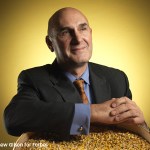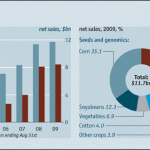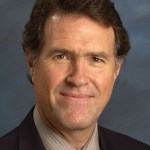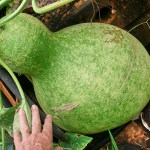Genetically engineered crops
Read Emily Waltz' interview with Roger Beachy, the new director for the National Institute of Food and Agriculture (NIFA), the new research funding arm of the US Department of Agriculture (USDA).
What does Beachy's appoinment mean for researchers, farmers and consumers?
Larger, longer grants with more money for education or extension, so the knowledge can reach from the lab to the food to the fork; a stonger focus on sustinable approaches; and a regulatory stucture that is science based
We need to build enhanced capacity in the US to address urgent agricultural challenges such as sustainable…
In an interview with The Times, Gordon Conway, Professor of International Development at Imperial College London and a former government adviser said that the ban on organic farmers using GM crops was based on an excessively rigid rejection of synthetic approaches to farming and a misconception that natural ways were safer and more environment- friendly than man-made ones.
I completely agree with Gordon Conway that it makes sense for farmers to use the most powerful tools available to make their production more sustainable. Still, I think it unlikely in the short term that organic farmers…
Here is another interesting story about Monsanto, in Forbes magazine. The article manages to avoid calling Monsanto all good or all bad and instead looks at what Monsanto means for the future productivity of the global food supply.
Thanks to Alex Palazzo for alerting me to the article The Paranoid Style in American Science by Daniel Engber of Slate.
This is a three-part series on radical skepticism and the rise of conspiratorial thinking about science. Unfortunately it is all too familiar. As Alex notes, the series discusses how certain people (i.e. climate skeptics, the ID movement, and the tobacco industry) have cultivated a notion of super-skepticism in an attempt to discredit current scientific consensus. Sadly, crop genetic engineering has also often been the target of such attacks.
The book I wrote with my husband…
The word is spreading- we can feed the world without damaging it, if we can entertain some new ideas.
Check out Paul Voosen's article in the NYT and let me know what you think.
On this blog, I will no longer be attempting to explain the difference between genetic engineering and molecular breeding. Instead I will simply refer those interested to Paul Voosen's fine article on the subject published in Scientific American and the New York Times today.
If you are a poor farmer in China, do you care if Monsanto dominates the seed industry in the US?
Apparently not. Several recent reports indicate a rapid launch of GE crops in the less developed world- independent of the US corporate seed industry.
The first news story, reported in the Wall Street Journal and by Reuters is that China has approved release of the worlds first genetically engineered rice. The Bt rice, which was developed by China's Huazhong Agricultural University, is predicted to reduce the use of insecticides by 80 percent while raising yields by as much as 8 percent. This is…
One of the pleasures of reading Stewart Brand's new book, "Whole Earth Discipline", is that when it comes to managing the Earth's ecosystem, he is unconstrained by conventional wisdom.
In a break with many old-school environmentalists, Brand argues that the established Green agenda is outdated, too negative, too tradition bound, too specialized, too politically one-sided to address the scale of environmental problems that we face today.
Who better to challenge the rigidity of the long-respected environmental movement than the distinguished writer, lecturer and author of the classic Whole…
An article in the Harvard International Review by Paul Collier paints a stark view of African peasantry. Collier presents a convincing argument that for African agriculture to become more productive, it needs modern agricultural technologies and new modes of organization
(Thanks to Eric Ward for alerting me to this article).
"The poverty of African peasants is not accidental: it is intrinsic to the peasant mode of economic organization. The very features that make the peasant mode of production appear attractive to jaded members of an industrialized society also make it unproductive. Large…
An appropriate technology, as asserted by the economist Schumacher in his book Small is Beautiful, should promote values such as health, beauty, and permanence. Low cost and low maintenance requirements are also of prime importance in Schumacher's definition.
Considering both Schumacher's observations and the goals for ecological farming:
⢠Produce abundant, safe and nutritious food
⢠Reduce harmful environmental inputs
⢠Provide healthful conditions for farm workers
⢠Protect the genetic make-up of native species
⢠Enhance crop genetic diversity
⢠Foster soil fertility
⢠Improve the…
Guest blogger Rob Hebert is a second-year student at Georgetown Law. Before moving to DC, he lived in Brooklyn, NY, just blocks from a bar that had over twenty-five beers on tap and thirty arcade machines that all played for a quarter. He can draw you a pretty interesting graph relating "Drinks Consumed" to "Last Score on Pac-Man."
Consumer advocacy groups are a strange animal. It seems that for every influential lobbying group with a senator's ear, there are hundreds or thousands with only vague mission statements and no clear agenda for attaining their stated goals. I once spent a summer…
The Changemakers international online community selected biofortified, a group website devoted to providing factual information and fostering discussion about plant genetics, especially genetic engineering, as the grand prize winner in the GMO Risk or Rescue Competition. This would not have been possible without the leadership of Karl Haro von Mogel, graduate student and blogger Anastasia Bodnar, our Australian colleague David Tribe and the votes of the science blogging community. Thanks all.
Here is the announcment:
Our entire team is excited to highlight your idea and your efforts on…
Kent J. Bradford, Professor of Plant Sciences and Academic Director of the Seed Biotechnology Center at UC Davis, is today's guest blogger.
Ever since our ancestors adopted an agricultural lifestyle about 10,000 years ago, our own sustainability has been intimately tied with that of our food production systems. Those systems currently support 6.7 billion humans, or more correctly, adequately support about 5.9 billion with another 800 million or so suffering from food insecurity, malnutrition or hunger. Compare that with the 1960's when the world population was 3 billion, with 1 billion…
When it comes to plants, there can be no gene flow without two compatible partners. And most plants are quite choosy, preferring a close relative rather than someone outside its family. Pollen travels in gusts of wind, on the pollen basket of bees, as cargo of flies or in the hands of human plant breeders. If the pollen alights upon a compatible mate, there will be fertilization and the resulting seed will carry the genes of the parents. What will happen then if a transgene from a genetically engineered crop plant cross-pollinates with wild relatives?
A new study in PNAS suggests that we…
The latest comments on my new blog reflect ample confusion about whether or not plant genetics can help poor farmers in India.
To demonstrate the power of genetics, I have posted a time-lapse video (4 months) showing the performance of a genetically improved rice in a flooded field plot at the International Rice Research Institute.
This video, shot by Gene Hettle, shows survival of the submergence tolerance (Sub1) rice, developed by our team, after a 17 day flood.
The Sub1 rice yielded about 3 fold more in these field trials. The IRRI team has also introduced the Sub1 gene into rice…






